June 23-July 6, 2008
Summary: More volunteers show up and we prepare for a visit from a group of Canadian volunteers from the ‘Children of Ecuador’ organization. This group spends six consecutive days working with us and we accomplish nearly a month’s worth of work in that time.
Over the weekend Mica and Danielle from New York and Andrew from L.A. arrived. Monday morning we gave the house a much needed cleaning.
Tuesday Jaime took the volunteers to the greenhouse revegetation site and they cleared weeds and put down booster soil on the trees. I spent the day around Bahia trying to get a lead on a neighboring landowner for the Planet Drum institute land. I also edited the materials for this week’s Bioregional education class.

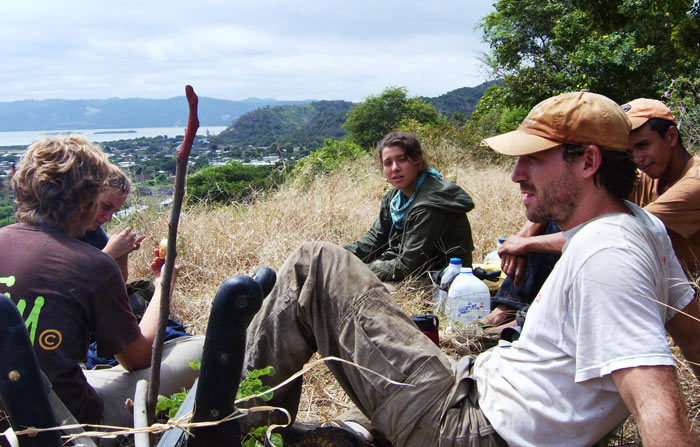

On Wednesday we made serious preparations for the Canadian group by collecting hundreds of three-liter bottles from around Leonidas Plaza and the city dump. Ricardito helped us out and we got a truck load of compost from Bahia’s abandoned garbage separation program. Additionally, the trails at the Nuevo Globo site were cleared and booster soil was put on the trees.
Thursday we watered the Granja site and ended up spending most of the day clearing weeds off the trees and watering half the site. In the afternoon I visited the community leader of El Astillero, a man named Patilla, who is helping to organize some work to do with the Canadian group.
Patilla has been organizing compost separation on a small scale in his neighborhood. He has also acquired native trees from the Fanca greenhouse (a Consejo Provincial program) and had them planted on the lower hills above the neighborhood. When Planet Drum started their revegetation site in the area, I consulted with Patilla about options for planting on the hillside overlooking the neighborhood for erosion control. We shared ideas and now both of us have sites planted.
With financial support from the Municipio he is maintaining this reforestation site and hopes to build a greenhouse to be able to plant more trees and produce fruit trees for the neighborhood. They are already collecting three-liter bottles for the greenhouse. With the Canadians we will increase the size of Patilla’s site and plant more trees. Despite being late in the season, the trees have a good chance for survival because they will be watered regularly by a Municipio-paid worker.
On Friday some of the volunteers took the day off to go camping up on the beach north of Jama. Others stayed back with Jaime and did some work in the greenhouse.
Those who worked Friday took the day off on Monday to visit Puerto Lopez and Isla de la Plata. The others, refreshed from their long weekend camping excursion, went to the Bosque Encantado site to clear trails. All of the trail-clearing at the sites in the past week has been to clear weeds from the sites so that we can accomplish loads of watering with the soon-arriving Canadian volunteers.
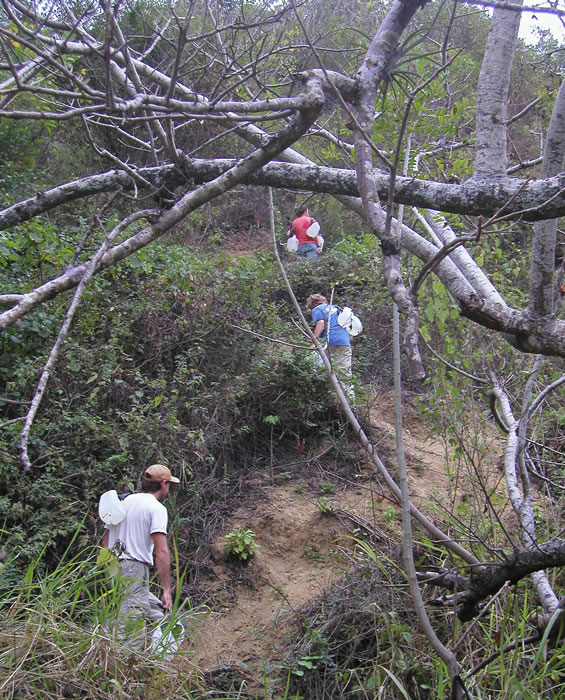
Tuesday morning we watered at our El Astillero site and then did some more work around the house.
In the afternoon the Canadians arrived. This group, representing the Children of Ecuador organization (www.childrenofecuador.ca), visited Bahia and worked with Planet Drum last year. They are working on several different projects around town. They are working with us in groups of 12-15 volunteers. Each group spends two days working on each of the three different projects. So for six days we have 12-15 extra volunteers helping out.
Tuesday afternoon we received the first group took a walking and watering tour of Bahia, hitting the sites that can be accessed without getting on the bus. Sites at Bosque en Medio de las Ruinas, La Cruz and Reales Tamarindos were all watered with double the normal amount of water.
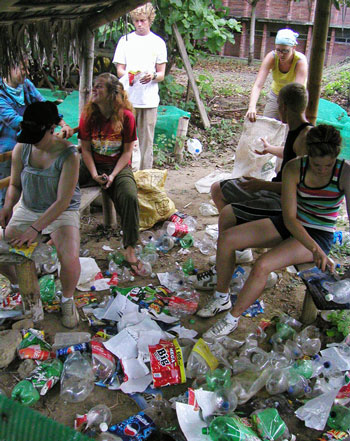
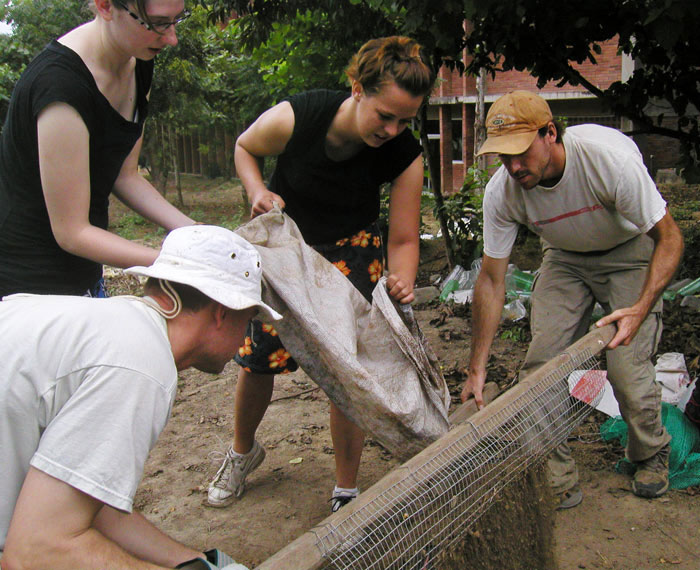

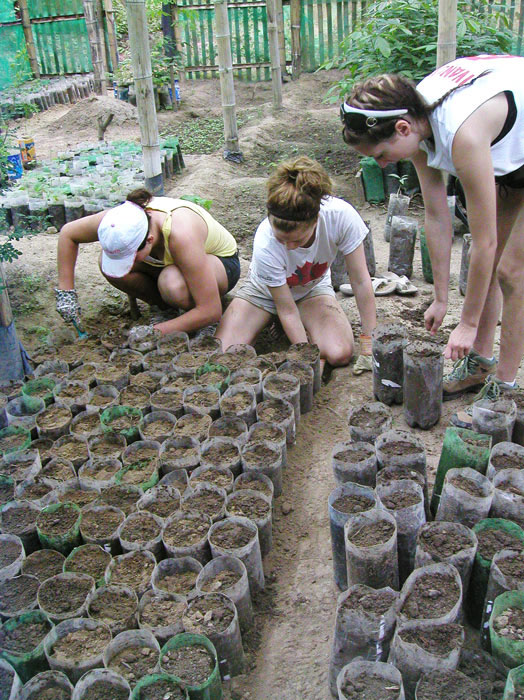
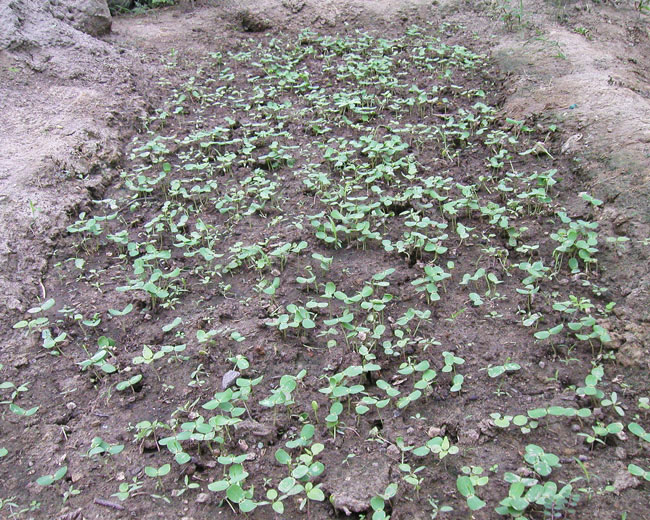
On Wednesday with the Canadians were at the greenhouse in the morning. Hundreds of bottles were cut and washed.
Huge piles of compost, sand and dirt were mixed to fill the bottles.
The bottles were filled and organized in the greenhouse.
We were waiting for the massive quantities of baby Algarrobos that have germinated to be big enough to transplant. Weeds were cleared from all the plants. The compost piles were turned and moved along in their process of decomposition.
A few Guachepeli and Algarrobos that were ready were transplanted. On top of all of this, the greenhouse revegetation site was watered, each tree receiving more water that usual.
Thursday a new group of Canadians showed up to help out with Planet Drum work. We took them to the Don Pepe site and demonstrated how to go about watering trees. The trees all got extra doses of water and then the Nuevo Globo site next door was watered. Things took a bit longer than usual because water ran out and had to be carried all the way in from the road. But with all of the extra help we were still able to water both sites in one day.
In the afternoon I took some of the Planet Drum volunteers to the Arte Papel recycled paper cooperative. We saw their workshop, bought some recycled paper products and even got to decorate some pieces on our own.
On Friday the sun was blazing and we took the group to the Astillero neighborhood and helped Patilla plant another hundred or so trees. Trails had to be cleared and holes dug. The trees were watered as they were planted and we also helped water some of the other trees they’ve planted there. The Astillero now has two large new revegetation sites on its hills.
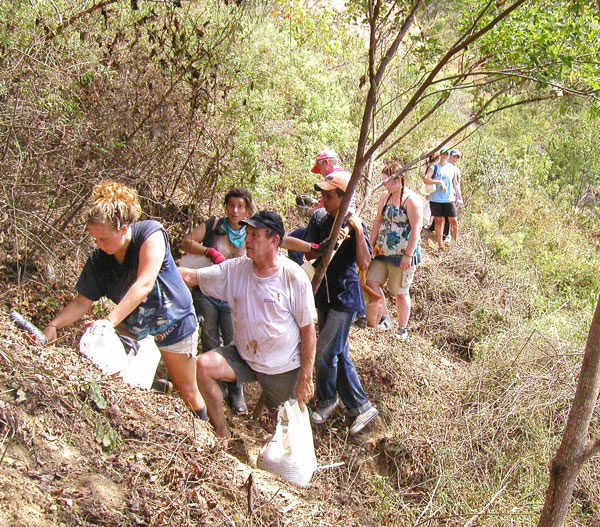
Volunteers planting trees and watering in El Astillero.
Saturday with the last Canadian group we went to sites in Fanca and watered La Granja and Bosque Encantado. At Bosque Encantado, the trees needed bowl shapes to be dug around them for watering and we also put down Tierramonte leaves on the trees.
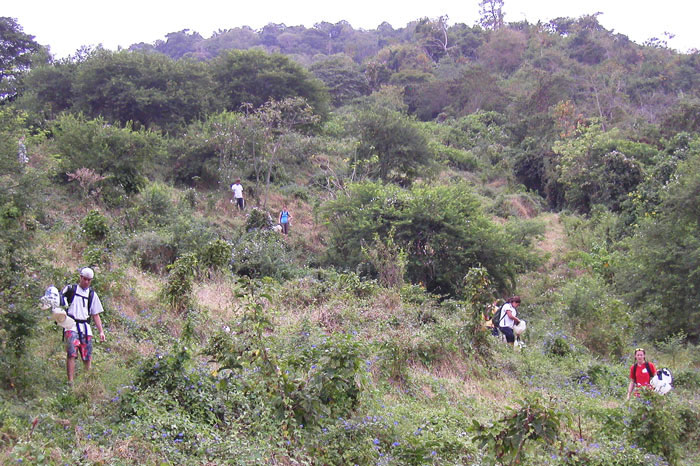
In the afternoon Planet Drum took a field trip to a pueblo in rice country to visit a friend who is promoting bee keeping and honey production in Ecuador and particularly the Dry Tropical forests of the province of Manabi.
We saw pictures of some of the workshops he has led and got to taste locally produced honey. Bee keeping is fairly easy and low cost and can generate income through honey production. It also benefits native tree species by pollinating their flowers.
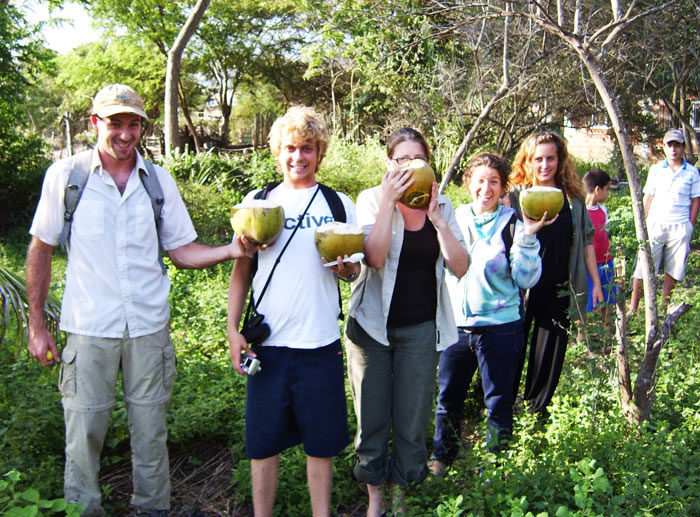
The Planet Drum crew drinking from coconuts while learning about bee keeping in a small town called Pasadero.
The final activity for the week with the Canadians was to visit the Los Caras community at kilometer 16. I arranged a community tour, a morning of tree planting work and a lunch with community leader Sebastian. We visited the community’s schools and farms.
Then we helped plant a batch of Caoba (Mahogany) in between some Maracuya (Passionfruit) plants.
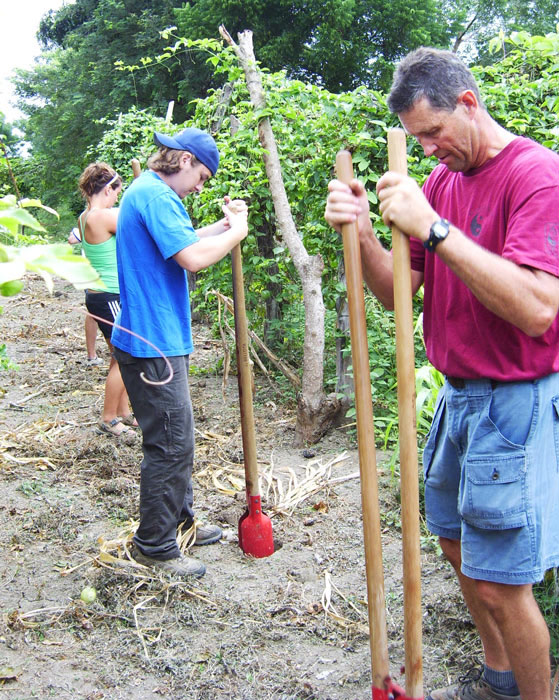
Digging holes for Caoba trees in Los Caras.
The volunteers also helped prepare soil and fill small tree bags.Each bag received soil and a Caoba seed. In five months, these trees will be a good size for planting during next year’s rainy season.

Volunteers fill bags with nutrient rich soil to plant seeds. Sebastian, community leader of Los Caras is in the background.
After the work, a lunch prepared by some of community members was served. We ate pumpkin soup with cheese; both ingredients coming directly from there. We also got to try a kind of soy meat made from soybeans grown in the community.

Members of the Los Caras community show off their organic soybean crops before our group departs.
It was a great way to finish up a long week of work. The members of the Los Caras community were very grateful for the visit and the work with them. They are an ecologically minded group and will take good care of the newly planted trees.
Many, many thanks to the Canadian volunteers who came and to helped out some of the groups working in Bahia. Planet Drum’s greenhouse and revegetation sites definitely appreciate it, as did the communities of El Astillero and Los Caras. We look forward to seeing you again next year. Your motivation and dedication are a real inspiration.
Pásalo bien.
Clay

Reader Interactions